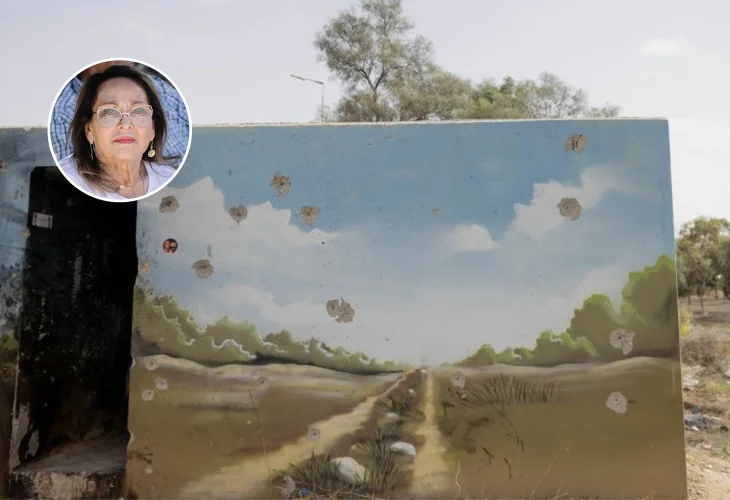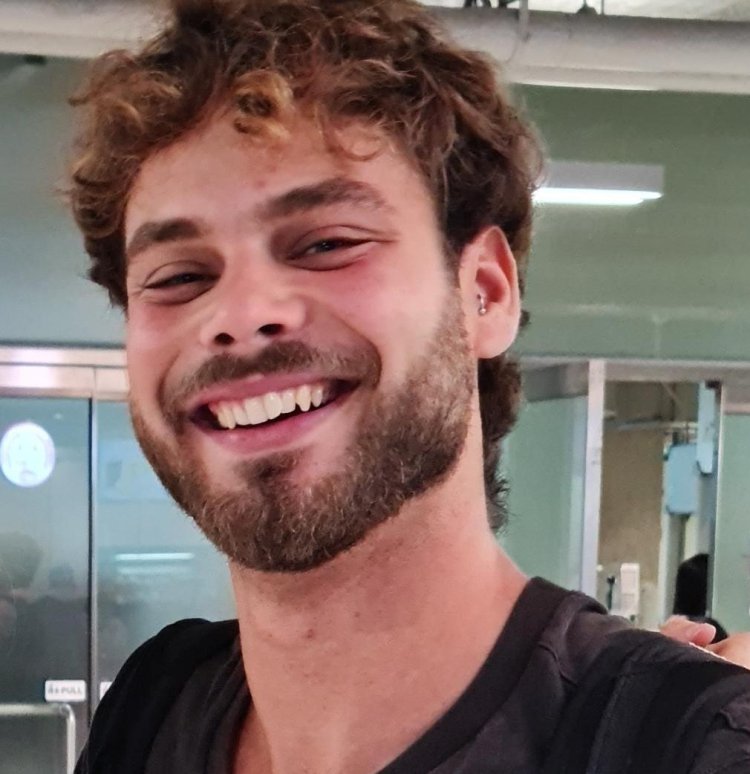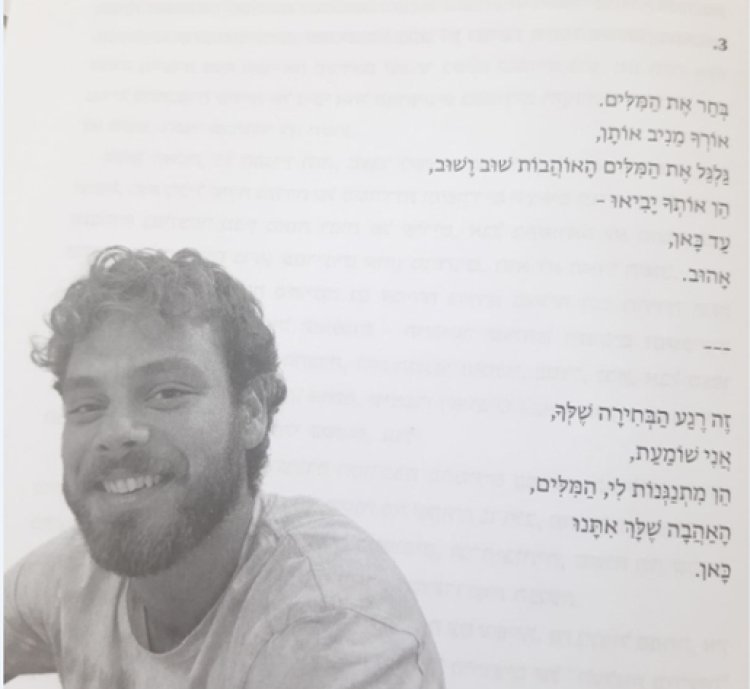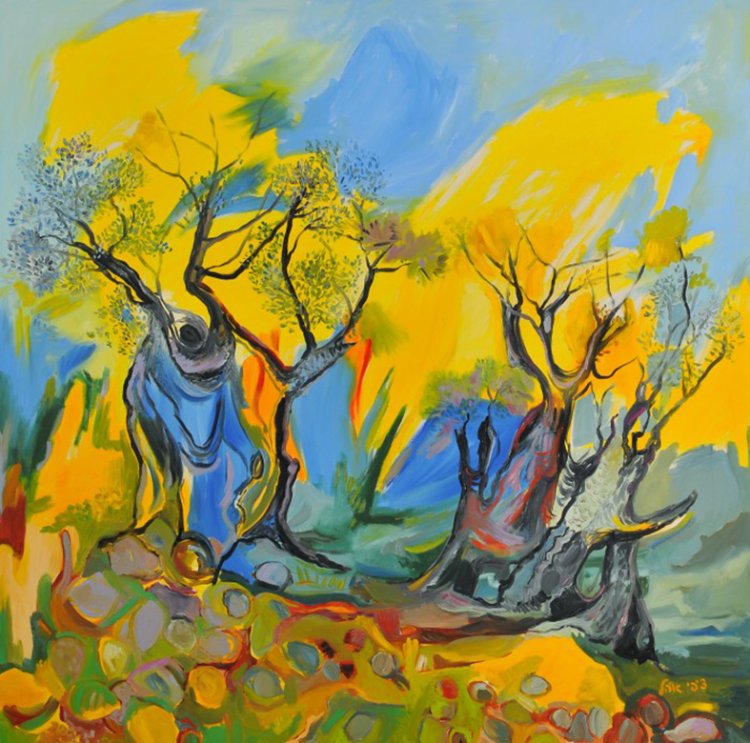Family's Unyielding Hope for Abducted Alon's Return
Tzipi Ahel, grandmother of abducted Alon Ahel, shares her family's emotional journey as they await his return with hope and positivity, while also focusing on awareness through art.
 The Secure Shelter (Photo: Haim Goldberg / Flash 90), inset: Tzipi Ahel, the grandmother
The Secure Shelter (Photo: Haim Goldberg / Flash 90), inset: Tzipi Ahel, the grandmotherAlmost two months ago, when a video from the 'death shelter' was released showing three abductees – Or Levy, Eliya Cohen, and Hirsch Goldberg-Polin in some of their most difficult moments, there was a fourth abductee whose face was not shown. That fourth person is Alon Ahel, who was taken from the shelter where 17 young people were killed, six survived, and four were abducted to Gaza. His parents allowed the release of the video recognizing its importance for freeing the abductees, on the condition that his face would not be visible; they themselves also refrained from watching the disturbing footage.
"I am very proud of the way my son and daughter-in-law handle the situation – Alon's parents," says Tzipi Ahel, Alon's grandmother. "Their behavior is inspiring, and I am moved seeing them make every effort to strengthen and unite the family, keep a positive atmosphere, and avoid being engulfed in the pain and uncertainty. From the very first moment, they understood that they truly have no control over what is happening with Alon, but they do have control over the home Alon will return to. This perspective guides them in the time that has passed since."
Tzipi pauses for a moment. It's clear it's not easy for her to talk about Alon, her close grandchild who is now so far away, held in Gaza with no known date for their reunion. "I am fully on board with the approach of my son and daughter-in-law," she emphasizes. "We live together in the town of Mitzpe Lavon in the north; another one of my sons also lives here with his family. We are all very united, waiting for Alon, but unwilling to let our spirits fall; we only keep strengthening each other."
 Alon Ahel. Abducted to Gaza from the death shelter
Alon Ahel. Abducted to Gaza from the death shelterA Child of Love
Tzipi is a multidisciplinary artist who has taught art and tried to support everyone around her with positive energy. "I never really knew how much power and influence we have on our surroundings," she says. "Only now do I start to understand the strength, seeing how those around us grow stronger and unite in activity for Alon."
What was your relationship like with Alon?
"I had a very unique relationship with Alon," Tzipi reminisces with deep longing, "Usually when I called him, he was too busy to answer, but I always knew he would get back to me when he had time, and he always did. Our conversations were very engaging. He always had something new to say and share, and he listened attentively to what I had to say.
"Alon's greatest talent was playing the piano, which he started in the fourth grade. Back then, I would often visit him when his parents were working; I'd sit and listen to him, captivated by the melodies... I tried to listen from a distance, as he clearly needed quiet to focus. Alon was an exceptional musician. My late husband, Dudik, who passed away eight years ago, could sit in an armchair and just listen to the music without needing to converse. The music said it all. Just today, I couldn't help it; I spent hours looking for the videos we took of Alon playing for us. It wasn't easy to watch them, but I felt I had to."
Tzipi's voice breaks as she shares: "I miss how Alon used to approach us, with a huge, slightly shy smile, full of heart and soul. It's a smile he's had since childhood, and I miss it dearly. Incidentally, that trait defined him – a perpetual smile and joyfulness; you could never anger or provoke him to yell. We once discussed this, and he told me he felt that anger leads nowhere and hatred only breeds more hatred. That was his life motto, and I personally resonated with it so much."
When did you last see Alon?
Tzipi takes a deep breath before she quietly recounts, "A week before the tragedy, I gathered all my grandchildren and children, and we went on a trip to the Dead Sea together. We hiked, swam in the waters, and camped with good food. Alon participated, having just returned from his big trip but unwilling to miss the family outing. The following week, we celebrated Sukkot, and then during Simchat Torah, we learned that Alon was at the Nova party and that contact with him was lost. We all began searching for him, and his father even went to Soroka Hospital but was told Alon was not there. Only when he was driving back home did we receive information from Itamar Shapira, a friend of Alon, who was also in the shelter and survived. He told us he saw, with his own eyes, Alon being abducted. Only after Itamar recovered from his injuries and surgery could he bring us this information. Only then did we understand the magnitude of the disaster."
 I so want to contribute and influence, to raise awareness.
I so want to contribute and influence, to raise awareness.Awaiting His Return
What has life been like for you since then? What have you been through these past ten months?
"Idit, my incredible daughter-in-law, understood from the outset that she had two choices – succumb to despair, knowing that Alon's return might take a long time, or rise up and do everything for the child. Since then, our lives have focused on one goal – preparing the home for Alon's return and ensuring he can continue his life exactly where he left off. This is why we pursue fulfilling many of his planned dreams – such as renting him a room in the apartment he wanted in Tel Aviv and advancing his enrollment in the music school where he planned to study. We're working on various aspects because we want him to seamlessly continue his life from where it paused.
"Additionally, we all strive to strengthen one another, providing support, so that Alon won't come back to a broken family. We want to be strong, which is why my son and daughter-in-law refused to watch the video; they didn't want to drag us back to the emotional state from Simchat Torah, as that might weaken us."
Tzipi notes that throughout the week, she and her family work in various ways to support Alon, gathering for Shabbat meals to share strength with one another. "We did this regularly before my husband Dudik passed away, and we continue it now."
"I also contribute in every way I can for Alon and all the abductees," Tzipi adds. "As a multidisciplinary artist – painting, sculpting, jewelry making, and even writing songs – I channel my talents into raising awareness for the abductees. People find it very engaging, and I feel fulfilled by it. I want so much to contribute and influence, to raise awareness and spread the values I live and believe in."
 I have a very special painting I drew for Alon
I have a very special painting I drew for Alon"I have a very special painting I created for Alon, and I've written thirteen songs for him and myself, filled with love, strength, and hope. I believe that as we fill ourselves with positive energy and act with strength and faith, those feelings transfer to him."
Describing her main exhibit, Tzipi shares: "It's a social initiative by female artists called 'More Than Ten'; we've been working together for over a year. Recently, we felt a strong need to create an exhibit expressing the turmoil and upheaval we're experiencing. It will be on display starting next month at the Amiad Center in Jaffa."
In conclusion, Tzipi wishes to convey a single message: "People need to understand that Alon happened to be in the wrong place at the wrong time, but it could have happened to anyone else, and we hope that everyone treats the issue of abductees as if they were their own children. May they all return home soon."

